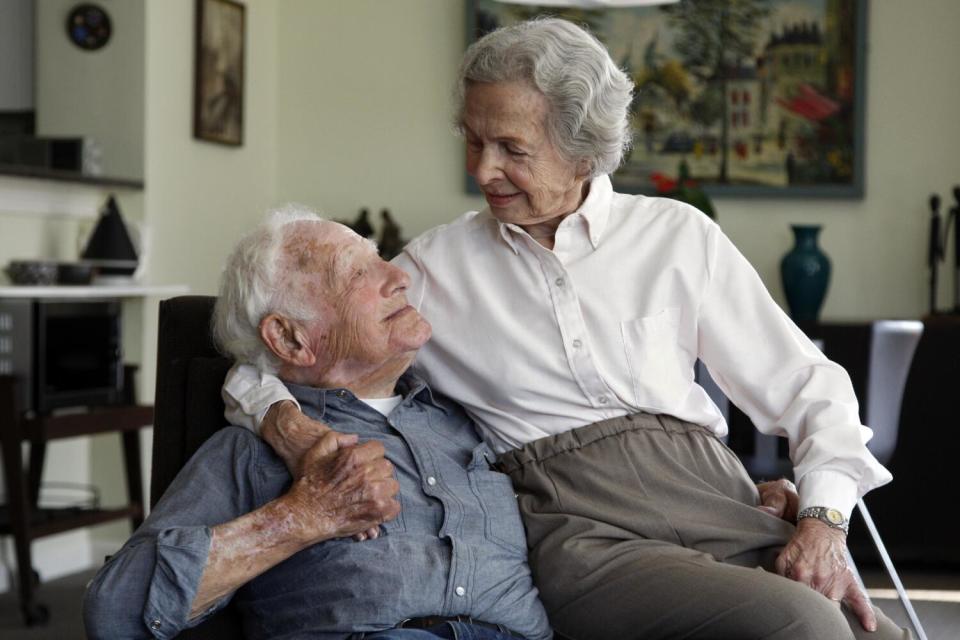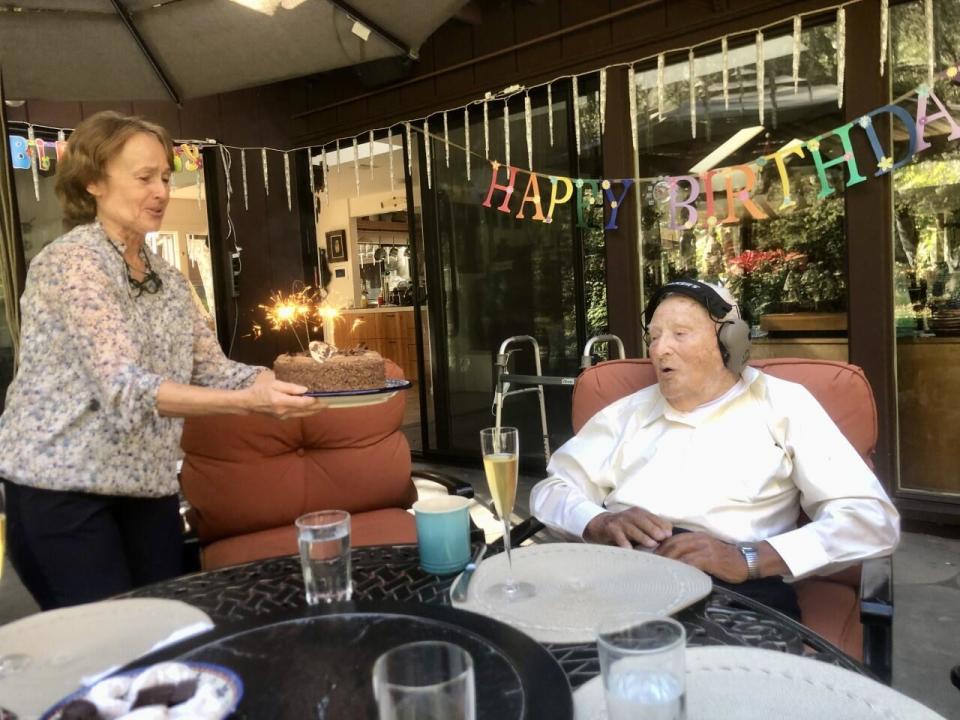Column: He was the oldest man in the U.S., and his loving caretaker was with him to the end

The oldest male in the United States was a man of many appetites, even at 110, and his live-in caretaker did her best to feed them.
Rosario Reyes would make banana pancakes for Morrie Markoff, and he would plead for more syrup. She’d bring him a corned beef sandwich, followed by a piece of lemon meringue pie, and reluctantly give in when he insisted on washing that down with a cup of hot chocolate.
Markoff wanted to read the paper, watch the news and get in some exercise every day, and Reyes helped make it happen. He made clear that on his 111th birthday next January, he fully expected an exotic dancer to perform in the living room of his Bunker Hill apartment, for the third straight year. Reyes already had the balloons in storage.
In their normal daily routine, they’d listen to classical music together or watch, yet again, two of Markoff’s favorite movies: “Midway” or “Guns of Navarone.” Markoff also liked "The Notebook," which Reyes hadn't seen. He bet her that if they watched it together, she would cry. And she did.
He called her by her nickname, Charito. She called him Mr. Morrie.
“It was kind of a remarkable relationship,” said Judith Hansen, Markoff’s daughter, who called Reyes an angel and one of countless unsung heroes in the elder-care ranks. “Dad would not have lived as long as he did without Charito. She’s an incredibly wise woman, and she knew what would keep him going. She knew that he was a man who wanted to accomplish something each day.”
And he usually did, until his body began giving out in April. Markoff was briefly hospitalized a few weeks ago and died at home June 3, with Charito holding Mr. Morrie’s hands in hers.
“He died in peace,” she said.
I was lucky to have met Markoff when he responded to a 2012 column I wrote about having been resuscitated after going into cardiac arrest following knee replacement surgery. He'd been a goner, too, Markoff said, just shy of his 99th birthday, and we ought to have a cup of coffee and “hang around” together as full-fledged members of the Back From the Dead Club.
Markoff grew up in a New York City tenement, dropped out of school after eighth grade, went to a trade school, married his beloved Betty in 1938 and moved west, where he sometimes drove her crazy with his manic energy and argumentative nature. As he aged and mellowed, Markoff swooned over his beloved “Betsy,” as he called her, and after she died in 2019, he couldn’t stop singing a song he wrote about pining to be with her again.
Read more: Column: A looming crisis: the crushing cost of elder care and the crippling effects of low wages
I had the pleasure of being at Markoff's 100th birthday party (there was cake, but no exotic dancers), Betty’s 100th and their 75th wedding anniversary. He once said to me that he couldn’t recall being bored a day in his life, and that was his gift to all of us: the reminder that if you stay plugged into the world around you and open yourself to new experiences, the aging process can slow to a crawl.
“If I had to put my finger on one thing that helped his longevity, I would say it was his innate curiosity about everything,” said his son, Steven, who, like his sister, is in his 80s.
That and, of course, the luck of good genes.

“You could bring him a sow bug," Steven said, "and he would say, ‘Look, it rolled into a little ball. How did it do that?’ Or he would say, ‘I just met the most interesting person in the world on a bus.’”
In fact, Morrie and Betty loved exploring Los Angeles by bus, and one day they met Tracy Huston, the owner of a Chinatown gallery. Markoff, who was trained as a machinist but held a variety of jobs, mentioned that while servicing and repairing gadgets and appliances, he’d noticed that a toilet tank float looked like the skirt of a ballerina. So he began welding scrap metal parts together, fashioning dozens of sculptures, including a ballerina.
Huston was intrigued, and in 2014, I attended Markoff's first-ever art exhibit, in her gallery. It was yet another high point in a life that had just hit the century mark, and one of my most prized possessions — a gift from Markoff — is his sculpture of his daughter reading a book.
I once visited the Markoffs with the late Times photographer Gary Friedman, who adored them. When Markoff mentioned that he’d taken thousands of black-and-white photographs on his world travels, Friedman was astonished by the quality of the work in Markoff's neatly archived albums and told him they ought to be in a museum.
Markoff frequently talked to me about his years-in-the-making memoir, and the working title was his answer to a question he fielded often: “What is the secret to a long life?” Markoff was 103 when he sold copies of “Keep Breathing” from his very own booth at the L.A. Times Festival of Books.
Read more: Column: A visit with my late mother’s nurse, and a lesson on what you should know about hospice care
When I wrote about attending his 109th birthday party last year, I noted that Markoff’s live-in care was a luxury many people won’t be able to afford, given longer lifespans. He’d saved and invested well, Steven told me at the time, but the cost of 24-hour care can easily run $10,000 to $15,000 monthly, and the shortage of home healthcare workers is a massive unaddressed challenge.
“The real lesson learned from this is how unprepared our government is to deal with end of life for people,” Steven told me the other day. “It seems to me a tragedy, with all the money that’s spent in other ways.”
When Markoff was nearing the end, Judith got the idea that with so many millions of people experiencing dementia in old age, her father’s extraordinary brain might be useful to researchers. She went to the National Institutes of Health website and was linked to Tish Hevel of the nonprofit Brain Donor Project, who gladly accepted the donation.
“Lots of studies are being done on super-agers, and he may be the super-est of super-agers,” Hevel told me. “Some people in brain banking think this could be the oldest cognitively intact brain that is now preserved.”
Hevel said 16,000 brains are in the bank, helping researchers study mental illness, Parkinson’s disease, cognitive loss and other neurological disorders. Having a healthy brain like Markoff’s can be invaluable, Hevel said, for comparative analysis.
“I think Dad would be tickled to death to know that someone was interested enough to analyze his brain,” said Steven, who had lunch with his father weekly and was struck by how sharp he remained until several weeks ago, when he began to fade and the family decided to begin hospice care.
Read more: Column: They take care of aging adults, live in cramped quarters and make less than minimum wage
Reyes, who has a daughter in college, met the Markoffs about 20 years ago, when she worked as their housekeeper. It was only in the last few years that the native of Peru became Markoff's full-time caregiver. When I met with her Saturday morning at Markoff's apartment, she shared a packet of handwritten notes he'd written to me but hadn’t yet mailed.
“With all the young people being killed in fruitless wars,” he wrote in one, using cursive on lined paper, “the undertakers don’t need me. They are busy enough.”
He was a lifelong progressive, and Reyes said he told her he had lived through many of the world’s miseries, including the Spanish flu and COVID-19 pandemics, two world wars and the death of civil discourse over the last several years.
“This was always his favorite place,” Reyes said, showing me the sunroom from which Markoff would take in the view of downtown L.A. high-rises.
He was like the Energizer bunny, she said, in a hurry to drag out the trash bins or head out for a brisk walk. She said she had to hustle to keep him busy, so each day, on a legal pad, she wrote a list of things for Markoff to do, including read the paper, exercise, play cards, watch the evening news, reach out to family and work on his blog (he billed himself as the world’s oldest blogger).
“Always make a plan,” she recalled him saying on many occasions. “Never stop. Next. Next. Next.”

She showed me a video she took of Markoff watching news of the solar eclipse in April.
“I’m a lucky man,” he said. “It’s wonderful to sit here in comfort and watch the eclipse happen.”
In Markoff's final hours, Reyes told him he was going to be with Betty again. It was the saddest moment of her life, she told me, but knowing Markoff wouldn’t want to go on living if he couldn’t keep moving, keep discovering, keep making plans, she told him he would be better off.
His color changed at the moment of his death, Reyes said, and she told him to reach for Betty’s hand.
“He died in peace,” Reyes said. “And he’s where he wants to be.”
This story originally appeared in Los Angeles Times.


